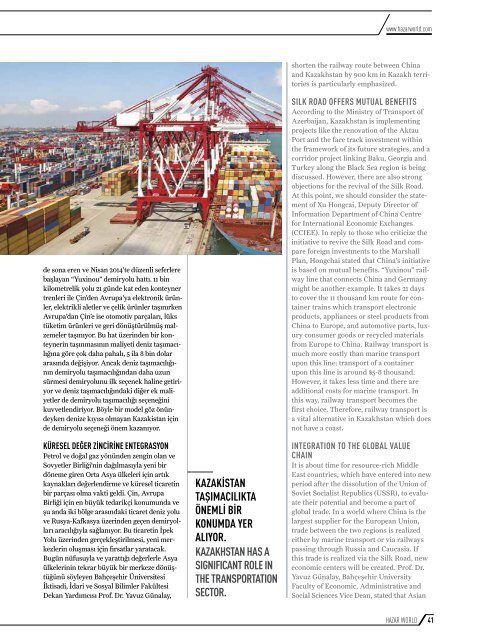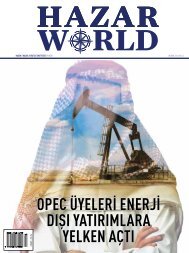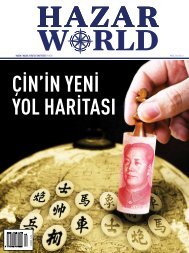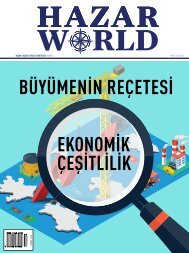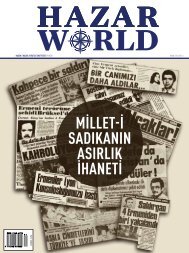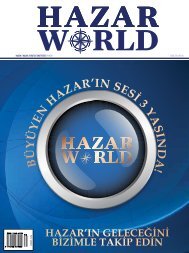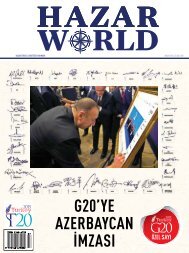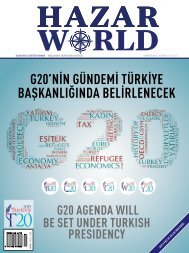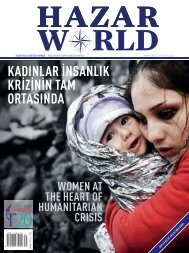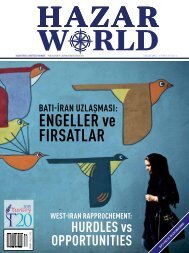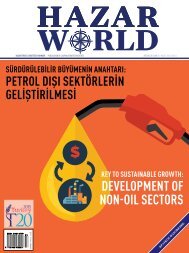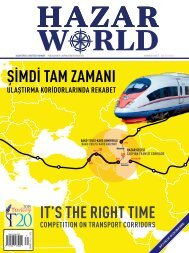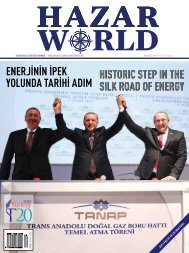Hazar World - Sayı:30 - Mayıs 2015
You also want an ePaper? Increase the reach of your titles
YUMPU automatically turns print PDFs into web optimized ePapers that Google loves.
www.hazarworld.com<br />
shorten the railway route between China<br />
and Kazakhstan by 900 km in Kazakh territories<br />
is particularly emphasized.<br />
de sona eren ve Nisan 2014’te düzenli seferlere<br />
başlayan “Yuxinou” demiryolu hattı. 11 bin<br />
kilometrelik yolu 21 günde kat eden konteyner<br />
trenleri ile Çin’den Avrupa’ya elektronik ürünler,<br />
elektrikli aletler ve çelik ürünler taşınırken<br />
Avrupa’dan Çin’e ise otomotiv parçaları, lüks<br />
tüketim ürünleri ve geri dönüştürülmüş malzemeler<br />
taşınıyor. Bu hat üzerinden bir konteynerin<br />
taşınmasının maliyeti deniz taşımacılığına<br />
göre çok daha pahalı, 5 ila 8 bin dolar<br />
arasında değişiyor. Ancak deniz taşımacılığının<br />
demiryolu taşımacılığından daha uzun<br />
sürmesi demiryolunu ilk seçenek haline getiriyor<br />
ve deniz taşımacılığındaki diğer ek maliyetler<br />
de demiryolu taşımacılığı seçeneğini<br />
kuvvetlendiriyor. Böyle bir model göz önündeyken<br />
denize kıyısı olmayan Kazakistan için<br />
de demiryolu seçeneği önem kazanıyor.<br />
KÜRESEL DEĞER ZİNCİRİNE ENTEGRASYON<br />
Petrol ve doğal gaz yönünden zengin olan ve<br />
Sovyetler Birliği’nin dağılmasıyla yeni bir<br />
döneme giren Orta Asya ülkeleri için artık<br />
kaynakları değerlendirme ve küresel ticaretin<br />
bir parçası olma vakti geldi. Çin, Avrupa<br />
Birliği için en büyük tedarikçi konumunda ve<br />
şu anda iki bölge arasındaki ticaret deniz yolu<br />
ve Rusya-Kafkasya üzerinden geçen demiryolları<br />
aracılığıyla sağlanıyor. Bu ticaretin İpek<br />
Yolu üzerinden gerçekleştirilmesi, yeni merkezlerin<br />
oluşması için fırsatlar yaratacak.<br />
Bugün nüfusuyla ve yarattığı değerlerle Asya<br />
ülkelerinin tekrar büyük bir merkeze dönüştüğünü<br />
söyleyen Bahçeşehir Üniversitesi<br />
İktisadi, İdari ve Sosyal Bilimler Fakültesi<br />
Dekan Yardımcısı Prof. Dr. Yavuz Günalay,<br />
KAZAKİSTAN<br />
TAŞIMACILIKTA<br />
ÖNEMLİ BİR<br />
KONUMDA YER<br />
ALIYOR.<br />
KAZAKHSTAN HAS A<br />
SIGNIFICANT ROLE IN<br />
THE TRANSPORTATION<br />
SECTOR.<br />
SILK ROAD OFFERS MUTUAL BENEFITS<br />
According to the Ministry of Transport of<br />
Azerbaijan, Kazakhstan is implementing<br />
projects like the renovation of the Aktau<br />
Port and the face track investment within<br />
the framework of its future strategies, and a<br />
corridor project linking Baku, Georgia and<br />
Turkey along the Black Sea region is being<br />
discussed. However, there are also strong<br />
objections for the revival of the Silk Road.<br />
At this point, we should consider the statement<br />
of Xu Hongcai, Deputy Director of<br />
Information Department of China Centre<br />
for International Economic Exchanges<br />
(CCIEE). In reply to those who criticize the<br />
initiative to revive the Silk Road and compare<br />
foreign investments to the Marshall<br />
Plan, Hongchai stated that China’s initiative<br />
is based on mutual benefits. “Yuxinou” railway<br />
line that connects China and Germany<br />
might be another example. It takes 21 days<br />
to cover the 11 thousand km route for container<br />
trains which transport electronic<br />
products, appliances or steel products from<br />
China to Europe, and automotive parts, luxury<br />
consumer goods or recycled materials<br />
from Europe to China. Railway transport is<br />
much more costly than marine transport<br />
upon this line; transport of a container<br />
upon this line is around $5-8 thousand.<br />
However, it takes less time and there are<br />
additional costs for marine transport. In<br />
this way, railway transport becomes the<br />
first choice. Therefore, railway transport is<br />
a vital alternative in Kazakhstan which does<br />
not have a coast.<br />
INTEGRATION TO THE GLOBAL VALUE<br />
CHAIN<br />
It is about time for resource-rich Middle<br />
East countries, which have entered into new<br />
period after the dissolution of the Union of<br />
Soviet Socialist Republics (USSR), to evaluate<br />
their potential and become a part of<br />
global trade. In a world where China is the<br />
largest supplier for the European Union,<br />
trade between the two regions is realized<br />
either by marine transport or via railways<br />
passing through Russia and Caucasia. If<br />
this trade is realized via the Silk Road, new<br />
economic centers will be created. Prof. Dr.<br />
Yavuz Günalay, Bahçeşehir University<br />
Faculty of Economic, Administrative and<br />
Social Sciences Vice Dean, stated that Asian<br />
HAZAR WORLD<br />
41


